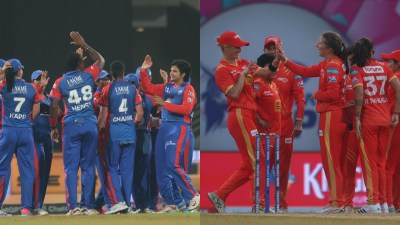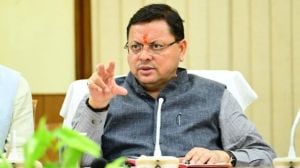Reforms road: Dr looks left, walks straight
Economic reforms are needed and will be 8216;8216;pushed forward,8217;8217; said the next Prime Minister, Manmohan Singh, today and the ...

Economic reforms are needed and will be 8216;8216;pushed forward,8217;8217; said the next Prime Minister, Manmohan Singh, today and the process will have a 8216;8216;human face8217;8217; to tackle poverty and unemployment.
Marking the broad contours of his vision, Singh also deftly steered clear of the Left8217;s hard rhetoric on disinvestment. Ruling out privatisation of government banks and PSUs like GAIL and ONGC8212;two of the navratnas8212;he, however, said they were free to tap the markets to raise funds and offer shares to the public. The NDA government raised nearly Rs 10,000 crore through disinvestment of 10 per cent equity in both GAIL and ONGC in March earlier this year.
8216;8216;While remaining as public enterprises, if they PSUs want to raise resources through disinvestment or through sale of equity, they are most welcome,8217;8217; Singh said.
The markets may have dropped 74 points cautious of who the Finance Minister will be but clearly, the IPO route for PSUs is very much open.
In a nod to the Left, Singh said that he would be careful that a large pool of workers was not rendered jobless through disinvestment decisions.
Singh, an economist and former RBI Governor and Finance Minister who launched the first wave of reforms in the country 13 years ago, said only loss-making state firms would be privatised first.
Saying that public sector enterprises wanting to compete with private sector enterprises should be allowed to go forward, he said, 8216;8216;If they can8217;t compete on an equal footing with the private sector or if they become a drag on the exchequer, then privatisation may help by all means.8217;8217;
| nbsp; |
ECONOMIC PRESCRIPTION
|
||||
| nbsp; |
8226; No privatisation of ONGC and GAIL, disinvestment through IPO route Story continues below this ad POLITICAL PRESCRIPTION |
nbsp; | |||
The Disinvestment Ministry has classified 65 PSUs under the category of loss-making companies while another 48 in the list of PSUs under various stages of disinvestment.
Asked if the Left parties would be an impediment to the reform process, Singh said: 8216;8216;Our friends in the Left have a different perception of past economic policies but they are also great patriots8230;Life is never free from contradictions and the coalition government will try to promote strong and stable government and create relations with allies to fight against poverty, ignorance and disease.8217;8217;
Singh said he did not foresee any difficulties in pursuing economic policies and moving forward on the basis of the Common Minimum Programme which would be ready in a couple of days.
The CMP would be growth-oriented, progressive and create an environment that was investment-friendly. 8216;8216;There should not be any misgivings in this regard.8217;8217;
As for infrastructure, Singh said that would be an emphasis for his coalition government, the focus on building new airports and increasing power generation. 8216;8216;The time has come for India to emerge as an economic power,8217;8217; he said.
In a message to NRIs, he said, 8216;8216;I invite them to show much more interest in the development of the country and the Government will create an environment where our industrialists, both NRIs and domestic, can increase investments and create more wealth in the country8217;8217;.
Singh said that his government will 8216;8216;not dismantle8217;8217; the national highways scheme which was the NDA government8217;s showpiece success.
8216;8216;There is need for massive investment in roads and I assure you we are not out to dismantle the scheme of the previous government. We will make an assessment of the road project,8217;8217; he said and added that emphasis would be put on 8216;8216;rural connectivity.8217;8217;
On the political front, Singh said there were several challenges ahead as communal harmony needed to be strengthened. On the victims of Gujarat and the 1984 anti-Sikh riots, he said there could be no compensation for people who have lost their relatives. But commenting on Gujarat, he expressed concern over the functioning of the judiciary and the delay in justice for the victims.
Asked whether his government would consider imposing President8217;s rule in Gujarat, he said, 8216;8216;This is too serious a matter to discuss in a press conference8230;Centre-state relation was too delicate an issue to discuss like this.8217;8217;
On Pakistan, he said friction between the two countries should be a 8216;8216;thing of the past8230;We seek the most friendly relations with our neighbours, more so with Pakistan than with any other. We must find the ways and means to resolve all outstanding problems that have been a source of friction and the unfortunate history of our relations with Pakistan.8217;8217;
8216;8216;That is not impossibe. Who could have imagined that some 15 years ago the Berlin wall would melt, then the world saw what was impossible in international politics became a norm,8217;8217; Singh said.
On Ayodhya, he gave primacy to the judicial process: 8216;8216;We want the law of land should prevail8230;However, if serious negotiations are on among the contesting parties and a sensible agreement is reached that has the sanction of the court, that can also be explored.8217;8217;
8216;8216;The essence of Hinduism,8217;8217; Singh said, 8216;8216;is that paths may be different but the goal is the same. I seek the cooperation of all patriotic Indians in the 8216;dharam yudh8217; against poverty, ignorance and disease8230;If we are divided in the name of religion, the country is in danger. To strengthen development, we have to create an environment of peace.8217;8217;
On whether the government would talk to all parties, including the Hurriyat Conference, for peace in Jammu and Kashmir, he said, 8216;8216;As far as the Jammu and Kashmir policy is concerned, our party is in favour of discussion with all interested groups. We will explore all possible opportunities to bring peace and prosperity to this vital state.8217;8217;
- 01
- 02
- 03
- 04
- 05































